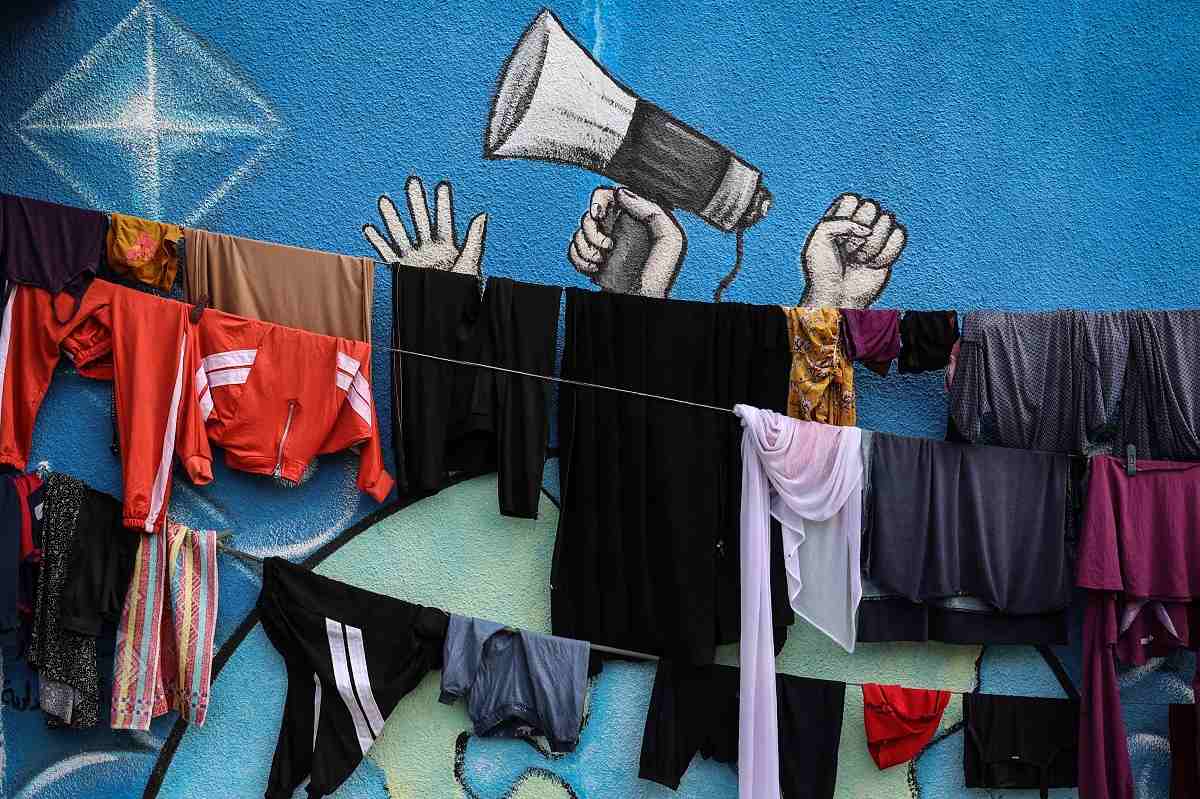
Laundry hanging in Khan Younis.
11:46 JST, October 30, 2023
KHAN YOUNIS, Gaza Strip – Israel expanded its ground and air assault in Gaza on Sunday, pummeling the north in what residents said was among the worst bombardments of the war as they struggled to count the dead and assess the damage.
Communications in the besieged enclave, cut by Israel on Friday night, were partially restored Sunday morning at the Biden administration’s urging, according to a senior U.S. official.
But growing calls for a cease-fire or humanitarian pause went unheeded as the death toll in Gaza soared past 8,000, according to Gaza’s Health Ministry.
The families of the more than 220 Israeli citizens and foreign nationals held hostage by Hamas, meanwhile, remained divided over the government’s decision to expand the ground assault. Israeli commanders say the campaign is aimed at dismantling Hamas in Gaza and bringing home the hostages kidnapped by Hamas fighters in their Oct. 7 attack on Israeli communities, in which they also killed more than 1,400 Israelis.
In the north of Israel, Hezbollah fighters and Israeli soldiers continued to exchange fire, threatening to open a second front in the three-week-old war, a day after the U.N. Interim Force in Lebanon called for an immediate cease-fire after its compounds were hit twice on Saturday.
In the occupied West Bank, Israeli soldiers and settlers shot at least five more Palestinians dead, adding to the more than 100 killed there by Israeli forces and settlers since the current war began.
Israeli air and artillery strikes on Gaza City and the northern Strip have intensified since Friday. The Israel Defense Forces on Saturday dropped more leaflets on northern Gaza warning residents to head south for their safety. Many in the north remained in hospitals, which they cannot feasibly leave, and bombardments continue across the enclave, leaving no refuge.
“During the communication loss, we were surrounded by fire belts from everywhere,” Yasser Wahidi, who lives in Tal al-Zaatar in northern Gaza, told The Washington Post. “We did not expect to live and conduct this interview with you. Entire neighborhoods were completely bombed.”
Wahidi said an Israeli strike on a neighbor’s house killed seven people. He believed scores of people had been killed over the three days in Tal al-Zaatar and more remained trapped under rubble.
“My neighborhood has turned into a ghost town,” he said. Booms echoed in the background. A house in the area was hit, Wahidi said. Panicked screams could be heard.
Israeli Rear Adm. Daniel Hagari said Sunday that the IDF had “increased the number of troops entering the Gaza Strip” overnight and was increasing ground operations and attacks “step by step.”
Later Sunday, the Israeli military said soldiers had killed and injured “a number of terrorists exiting the shaft of a tunnel” near the Erez crossing with Israel, while Hamas’s military arm said it was engaged in clashes with Israeli forces in the enclave.
The Post could not independently verify these accounts.
A senior U.S. official said Sunday that Israel had shut off communications in the enclave of 2.3 million and the United States had pressured the government to switch them back on. The Israelis did not tell their U.S. counterparts why they had switched off communications, the official said.
“We made it clear they had to be turned back on,” said the official, who spoke on the condition of anonymity to discuss sensitive negotiations. “The communications are back on. They need to stay back on.”
With limited internet and phone connections restored after a blackout of more than 30 hours, Gazans spent Sunday trying to find out who had been killed during the blackout and who was alive.
Many Gazans remained intermittently or entirely out of reach. Some calls went straight to voice mail or out-of-network messages; other connections were poor or dropped suddenly.
Worry over unreachable loved ones compounded Gazans’ anxiety, some told The Post.
“When they cut the internet, I thought: ‘They will finish us and no one will be able to know anything about us,'” said Warda, a mother in Gaza City. She spoke on the condition that her last name be withheld out of concern for her safety.
“There is no moment of quiet,” she said. “The destruction from the bombing continues. . . . The children all of them are afraid, terrified.”
She was aware of Israel’s warnings but said she could not move south.
“The price of transportation is very high and there are heavy strikes in the south,” she said.
Muhammad Abu Salmiya, director of al-Shifa Hospital in Gaza City, said the communication outage “exposed many wounded people to certain death due to the inability of ambulances and civil defense to reach them.”
Al-Shifa, the largest hospital in Gaza, is sheltering more than 50,000 displaced people. Patients are treated on the floor; doctors use flashlights to operate without anesthetics. Many medical staff are apart from their families, having worked around-the-clock for weeks; in some cases, they have discovered their own children among the dead.
“They get shocked by receiving their relatives and children killed and injured,” said a doctor at the hospital who spoke to The Post on the condition of anonymity for his own safety. “The screaming, the hysterical crying, it is all too much.”
“I think we’re back in the stone age,” said Marwan Shafiq al-Hams, the director of al-Najjar Hospital in Rafah. “We are now seriously considering using carrier pigeons, or asking mosques to inform us via loudspeakers of the locations of targets.”
In Khan Younis, health ministry workers were stationed on hills to assess where strikes hit and ambulances were needed, ambulance driver Naseem Hassan said.
The Palestinian Red Crescent Society said 34 trucks from its Egyptian counterpart carrying medical and food supplies entered through the Rafah crossing on Sunday, making 118 since Israel declared a “complete siege” on Oct. 9. Israel said fuel would still be prohibited entry without guarantees that Hamas would not siphon it off.
Without fuel, hospitals across the enclave have sharply limited care or closed altogether.
President Biden spoke with Israeli Prime Minister Benjamin Netanyahu on Sunday and “underscored the need to immediately and significantly increase the flow of humanitarian assistance to meet the needs of civilians in Gaza,” according to a White House statement.
The senior U.S. official said Israel agreed to raise the number of trucks inspected per day to 100. The prewar daily average was 450.
Conditions within the enclave, already a crisis before the war, continue to deteriorate.
UNRWA, the U.N. agency for Palestinian refugees, said “thousands of people” broke into its warehouses and distribution centers in southern and central Gaza and stole “basic survival items” including wheat flour and other supplies recently arrived from Egypt.
Thomas White, director of UNRWA affairs in Gaza, called it “a worrying sign that civil order is starting to break down.”
“People are scared, frustrated and desperate,” he said in a statement. “Tensions and fear are made worse by the cuts in the phones and internet communication lines. . . . They feel that they are on their own, cut off from their families inside Gaza and the rest of the world.”
Nabeel Shawa, a physician at Gaza City’s al-Quds Hospital, told The Post on Sunday that the Israeli military had threatened to strike the hospital and warned everyone to evacuate.
Earlier Sunday, a strike hit buildings 50 meters from the hospital, where 12,000 people are also sheltering, Shawa said. By 4 p.m. local time, Israeli airstrikes began in the vicinity of al-Quds Hospital.
Several departments sustained structural damage and patients were at risk of suffocation from heavy smoke, Palestinian Red Crescent Society spokesperson Abdalla Elayyan said.
“We don’t know what to do,” Shawa said. “We don’t have a way. If they hit us we will die.”
Top Articles in News Services
-

Survey Shows False Election Info Perceived as True
-

Hong Kong Ex-Publisher Jimmy Lai’s Sentence Raises International Outcry as China Defends It
-

Japan’s Nikkei Stock Average Touches 58,000 as Yen, Jgbs Rally on Election Fallout (UPDATE 1)
-

Japan’s Nikkei Stock Average Falls as US-Iran Tensions Unsettle Investors (UPDATE 1)
-

Trump Names Former Federal Reserve Governor Warsh as the Next Fed Chair, Replacing Powell
JN ACCESS RANKING
-

Producer Behind Pop Group XG Arrested for Cocaine Possession
-

Japan PM Takaichi’s Cabinet Resigns en Masse
-

Man Infected with Measles Reportedly Dined at Restaurant in Tokyo Station
-

Israeli Ambassador to Japan Speaks about Japan’s Role in the Reconstruction of Gaza
-

Videos Plagiarized, Reposted with False Subtitles Claiming ‘Ryukyu Belongs to China’; Anti-China False Information Also Posted in Japan

























